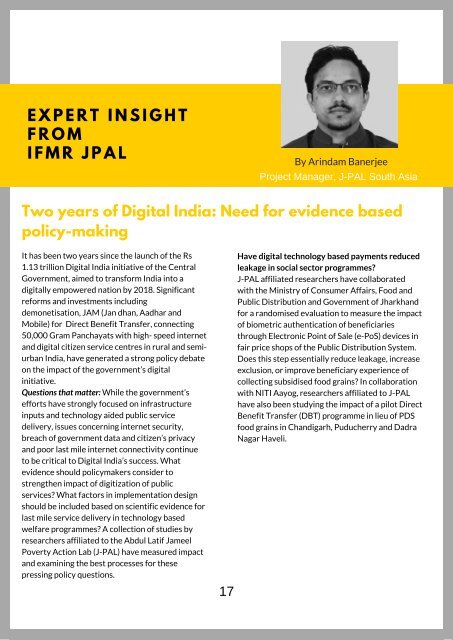You also want an ePaper? Increase the reach of your titles
YUMPU automatically turns print PDFs into web optimized ePapers that Google loves.
E X P E R T I N S I G H T<br />
F R O M<br />
I F M R J P A L<br />
By Arindam Banerjee<br />
Project Manager, J-PAL South Asia<br />
Two years of Digital India: Need for evidence based<br />
policy-making<br />
It has been two years since the launch of the Rs<br />
1.13 trillion Digital India initiative of the Central<br />
Government, aimed to transform India into a<br />
digitally empowered nation by 2018. Significant<br />
reforms and investments including<br />
demonetisation, JAM (Jan dhan, Aadhar and<br />
Mobile) for Direct Benefit Transfer, connecting<br />
50,000 Gram Panchayats with high- speed internet<br />
and digital citizen service centres in rural and semiurban<br />
India, have generated a strong policy debate<br />
on the impact of the government’s digital<br />
initiative.<br />
Questions that matter: While the government’s<br />
efforts have strongly focused on infrastructure<br />
inputs and technology aided public service<br />
delivery, issues concerning internet security,<br />
breach of government data and citizen’s privacy<br />
and poor last mile internet connectivity continue<br />
to be critical to Digital India’s success. What<br />
evidence should policymakers consider to<br />
strengthen impact of digitization of public<br />
services? What factors in implementation design<br />
should be included based on scientific evidence for<br />
last mile service delivery in technology based<br />
welfare programmes? A collection of studies by<br />
researchers affiliated to the Abdul Latif Jameel<br />
Poverty Action Lab (J-PAL) have measured impact<br />
and examining the best processes for these<br />
pressing policy questions.<br />
17<br />
Have digital technology based payments reduced<br />
leakage in social sector programmes?<br />
J-PAL affiliated researchers have collaborated<br />
with the Ministry of Consumer Affairs, Food and<br />
Public Distribution and Government of Jharkhand<br />
for a randomised evaluation to measure the impact<br />
of biometric authentication of beneficiaries<br />
through Electronic Point of Sale (e-PoS) devices in<br />
fair price shops of the Public Distribution System.<br />
Does this step essentially reduce leakage, increase<br />
exclusion, or improve beneficiary experience of<br />
collecting subsidised food grains? In collaboration<br />
with NITI Aayog, researchers affiliated to J-PAL<br />
have also been studying the impact of a pilot Direct<br />
Benefit Transfer (DBT) programme in lieu of PDS<br />
food grains in Chandigarh, Puducherry and Dadra<br />
Nagar Haveli.


